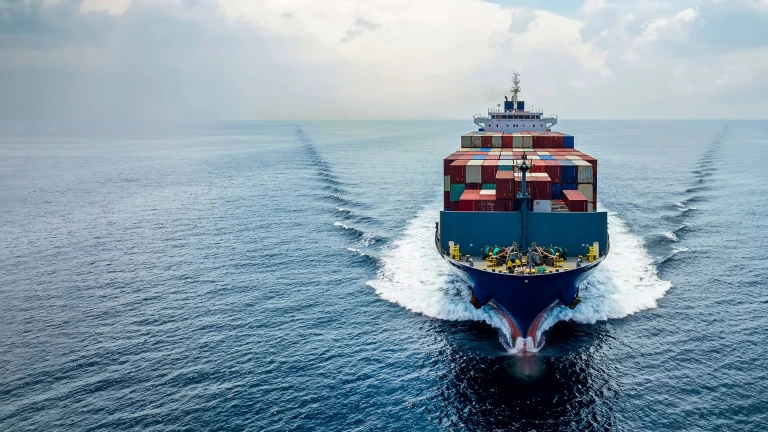The shipping industry is the backbone of the global economy, facilitating 90% of international trade and transporting over 11 billion metric tons of goods annually. Yet it is responsible for 2% to 3% of global greenhouse gas (GHG) emissions, which contributes to the supply-chain (Scope 3) emissions of every business with seaborne logistics. In 2023, the International Maritime Organization revised its GHG emissions target to achieve net zero emissions for shipping by or around 2050.
The Global Centre for Maritime Decarbonisation (GCMD) and Boston Consulting Group (BCG) conducted a first-of-its-kind industry survey to take stock of shipowners and operators’ progress in establishing six elements needed for the industry to reach net zero. The survey saw strong participation from 128 shipowners and operators across vessel types, fleet sizes and geographies, which collectively own or operate 14,000 merchant vessels, and account for $500 billion in revenue.
High Decarbonization Ambitions, Uneven Progress
We found high decarbonization ambitions: Most respondents viewed net zero as a strategic priority, and 77% had already set concrete decarbonization targets. The industry has also mobilized resources to decarbonize: respondents are investing 2% of their revenues into green initiatives, and 87% have personnel working toward green objectives.
The path to net zero for shipowners and operators requires six elements:
- A robust strategy and roadmap
- Four specific decarbonization levers to reduce emissions: operational efficiency, technological efficiency, fuel transition, and shipboard carbon capture
- Enablers such as dedicated sustainability teams, strategic investments in green initiatives, internal carbon prices, and digitalization
While the industry has made some progress in adopting mature and cost-effective efficiency levers, adoption of complex or nascent levers remains low. Drop-in green fuels are constrained by costs and supply-side gaps, and optimism for future cleaner fuels is yet to translate into firm commitment.
The industry is now at a pivotal point, with many shipowners and operators ramping up their decarbonization efforts. Three-quarters of respondents plan to increase investments in green initiatives. Stakeholders can build on this momentum with a variety of supportive actions. But to be effective, they need to tailor their interventions to address the specific challenges that shipowners and operators face at each stage of decarbonization.
Stay ahead with BCG insights on transportation and logistics
Three Decarbonization Archetypes
We see three archetypes, differentiated in their outlook, investment appetite, and the challenges faced.
Frontrunners have the greatest ambitions and are willing to invest heavily. They are pushing boundaries, adopting even nascent decarbonization levers, such as wind propulsion and air lubrication. A majority plan to pilot shipboard carbon capture solutions by 2025. Frontrunners are also planning to adopt methanol and ammonia as early as 2026 and 2029 respectively, and the availability of fuels and bunkering infrastructure will be critical to enabling adoption.
Followers believe in decarbonizing their fleets, but have tighter investment thresholds and a near-term outlook. They have kept pace with Frontrunners in adopting mature and cost-effective efficiency levers, such as main engine improvements and slow steaming, but are behind in the adoption of nascent levers, such as wind propulsion and air lubrication.
Conservatives are still early in their decarbonization journey, likely due to a lack of awareness and familiarity with the various decarbonization levers, and the capabilities to assess and deploy them. They are best supported by measures that increase their familiarity with the levers and help contextualize them to their specific fleets and operational requirements.
Call to Action
Our research highlights five key actions for stakeholders:
- Conduct technical pilots and facilitate data sharing, especially for nascent levers
- Create innovative financing mechanisms to de-risk adoption of less mature levers
- Raise awareness, contextualize levers, and build capabilities, especially among Conservatives
- Start to build out future fuels infrastructure at ports
- Develop mechanisms to equalize and share the costs of levers across the ecosystem
Maritime decarbonization is a complex, critical endeavor. The successful implementation of these five key actions demands a whole-of-value-chain approach. By working together, stakeholders can transform the maritime sector into a beacon of environmental stewardship, and set a course for a greener future where decarbonization and commercial success go hand in hand.
ABOUT THE GLOBAL CENTRE FOR MARITIME DECARBONISATION
The Global Centre for Maritime Decarbonisation (GCMD) partners with industry and governmental stakeholders to help international shippingeliminate its GHG emissions by shaping standards for future fuels, financing first-of-a-kind projects, piloting low-carbon solutions in an end-to-end manner and under real-world operations conditions, and fostering collaboration across different sectors.
To help address some of the key challenges that are bottlenecking maritime decarbonization, GCMD is focusing on initiatives in four areas: ammonia as a marine fuel, assurance framework for drop-in green fuels, unlocking the carbon value chain, and energy savings technologies to improve fuel efficiency of ships.
A nonprofit organization, GCMD was cofounded in 2021 by the Maritime and Port Authority of Singapore (MPA) and six industry partners—BHP, BW Group, Eastern Pacific Shipping, Foundation Det Norske Veritas, Ocean Network Express, and Seatrium. GCMD has additionally onboarded more than 100 center and project-level partners, all of whom share the common goals of accelerating the deployment of scalable low-carbon technologies by validating technical and commercial feasibility, and lowering adoption barriers by leveraging the data and insights from GCMD-curated pilots and projects.




